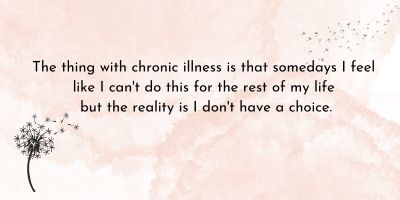Grief and Chronic Illness
When we think of grief, we associate it with losing someone we love. Grief is the feeling associated with loss. Grief for the chronic illness community is the loss of functioning, relationships, and work or career.
The Seven Stages of Grief
Dr. Jennifer Martin updated the stages of grief for chronic illness. These are seven stages of grief in chronic illness are denial, bargaining, anger, depression, loss of self-control, re-evaluation of life and acceptance.

Denial
Denial is ignoring the truth. I will tell myself that if I worked out harder or was more active, I would feel better. I also thought that the first hip surgery would be a cure all and I would recover and be able to do all the things that I have dreamed of.
Ignoring the signs my body is giving me that something is wrong.
Bargaining
Bargaining is thinking about the “what if’s”. What if the doctor is wrong? What if it is really all in my head? Maybe if I had done something differently than my situation would be different. I am constantly wondering, “what if?”
Anger
Anger is the second stage. I am mad at my body, the doctors, the system, and the world. I was angry at my parents. If I was not raised in a family where abuse and violence were a daily occurrence, maybe I would be healthy today. I know that my early life experience combined with my genetics was the perfect storm for developing a chronic illness. My body has betrayed me. I was angry at everyone who knew these things were happening but did nothing to stop it. Some would say, while I asked you if you have been abused and you said no. I said no because I was terrified. Everyone is terrified of the monster. He is unpredictable and can escalate quickly. I also noticed how much control he had and how nervous he made the extended family. It was obvious that they could not help me.
I was angry because I am a good person and why do bad things happen to good people.
Depression
Depression is a part of grief. It is hard for my husband to understand why I am so sad and crying so often. Depression hit hard and I was so overwhelmed by the pain in my hip. I could not sit, stand, or walk with any sort of comfort. It was hard for me to see a way out of the pain. I spent many evenings crying. After several years of treatments, I finally was able to convince the doctors to replace the hip. It took three doctors, many painful procedures and two surgeries. Once they went in to replace the hip, they realized that it was end stage arthritis. Every scan made it appear to be a mild case. My depression got better once the pain became tolerable again. It does still rear its ugly head.
Loss of Self Control
Losing who I was was difficult. The person who got out of bed in the morning and was ready to face the day now needs almost double the amount of time. She wakes up tired, in pain, and feeling like she never slept at all. Looking in the mirror I don’t know who is staring back at me.
Re-Evaluation of Life and Goals
Having to re-evaluate my life and goals is something I still struggle with. Knowing that I won’t be able to work to retirement and go on those outdoor active adventures I dream of. Acknowledging my new body and its limits and modifying my goals.
Acceptance
Acceptance is when you finally come to terms with your diagnosis and what it means for your future and your body. Being fine with the new you is difficult. I still feel like I am in a struggle between my body and brain. My brain isn’t always aligned with the capacity of my body.
The Cycle
With chronic illness, we go through the cycle of grief over and over with each flare, new symptom or diagnosis. Talk to friends about what you are feeling, be open with your partner and seek professional help from a therapist who specializes in chronic illness.